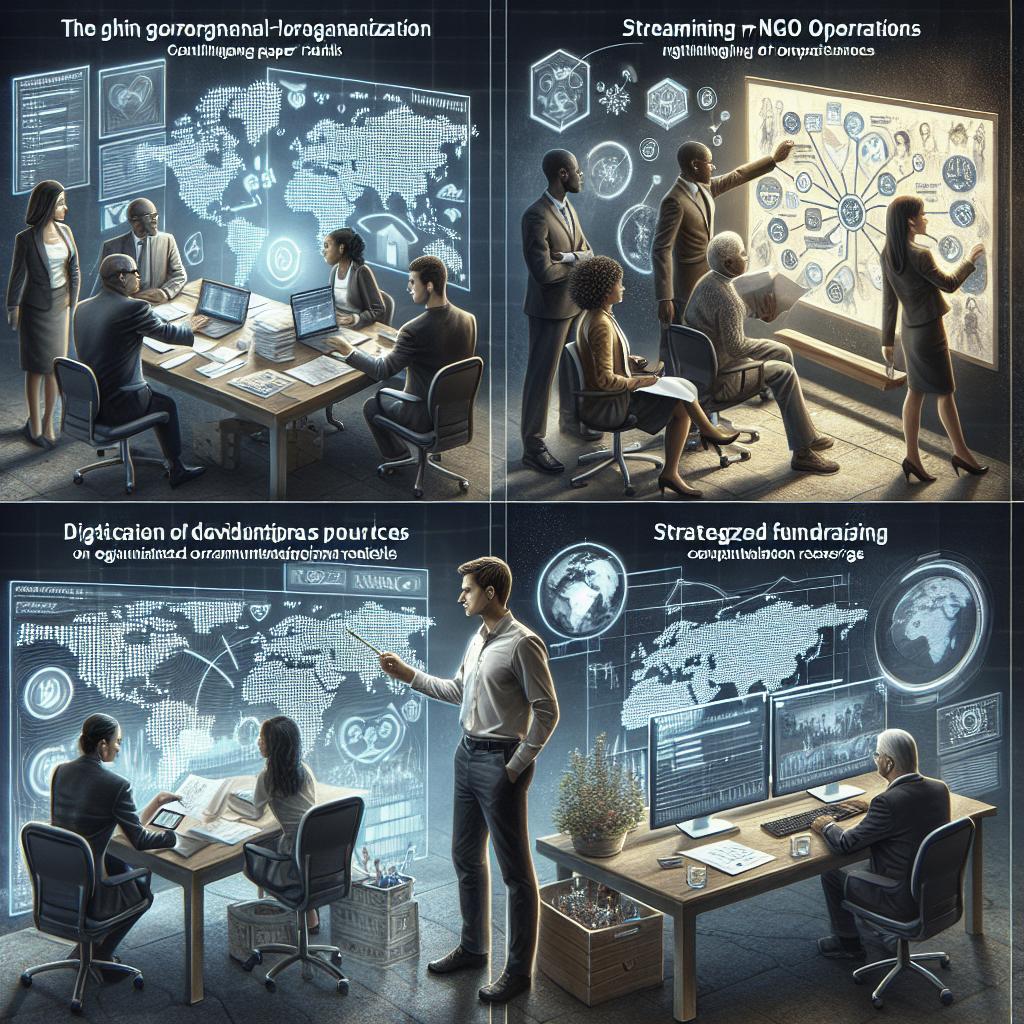“`html
Streamlining NGO Operations: Strategies for Efficiency
Non-Governmental Organizations (NGOs) play a critical role in addressing societal issues, but they often face challenges in operational efficiency. Streamlining their operations is essential to maximize impact and ensure sustainability. This article explores various strategies that can be implemented across key operational areas including resource allocation, staffing, compliance, fundraising, and impact measurement. By optimizing these facets, NGOs can better serve their missions, cope with budget constraints, effectively manage volunteers and staff, adhere to regulatory requirements, secure necessary funding, and accurately assess their impact. These strategies, when integrated, can help NGOs operate more smoothly and sustainably.
1. Resource Allocation and Budget Constraints
Resource allocation is a critical element for NGOs, often operating under tight budget constraints. Efficient allocation involves identifying core priorities and dedicating resources aligned with strategic goals. This can be achieved through meticulous financial planning and critically assessing current expenditures to cut down unnecessary costs. Streamlined budgeting facilitates robust financial health and ensures resources are channeled into impactful initiatives.
NGOs also benefit from leveraging technology to optimize resource allocation. Financial management software aids in tracking expenses, forecasting future financial needs, and streamlining auditing processes. Additionally, adopting open-source tools can significantly trim IT expenses while maintaining functionality and efficiency. These technologies not only save costs but also enhance transparency and accuracy in financial management.
2. Staffing and Volunteer Management
Human resources are the backbone of NGOs, and proficient management is crucial for smooth operations. Effective volunteer management systems, including recruitment, training, and retention, are paramount for NGOs that depend heavily on volunteer support. Offering meaningful experiences, recognition programs, and regular training can boost volunteer engagement and retention.
Digital tools can revolutionize staffing processes. Utilizing volunteer management software can streamline volunteer data management, scheduling, and communication, freeing up human resource managers to focus more on strategic planning. Similarly, embracing cloud-based HR solutions helps in managing employee records, performance metrics, and payroll with greater efficiency.
3. Regulatory Compliance and Reporting
NGOs must adhere to various regulatory frameworks that govern their operations. From financial reporting to annual submissions, compliance remains a significant operational challenge. Implementing a structured compliance management framework can simplify adherence and minimize legal risks. This may involve regular compliance audits and assigning dedicated personnel to monitor changes in regulations affecting the organization.
Digital solutions can also aid in compliance management. Regulatory compliance software can automate reporting processes, keep track of legal requirements, and set reminders for deadlines. These systems ensure that NGOs remain compliant with legal mandates, reducing the likelihood of penalties and safeguarding their reputation.
4. Fundraising and Revenue Generation
For NGOs, fundraising strategies are central to sustaining operations. A diversified approach, incorporating online campaigns, strategic partnerships, and community events, can significantly enhance revenue streams. Leveraging data analytics to identify donor trends and preferences strengthens campaign effectiveness and donor retention.
Technology plays an instrumental role in modern fundraising efforts. Utilizing crowdfunding platforms and social media campaigns can expand outreach exponentially. Meanwhile, Customer Relationship Management (CRM) systems enable NGOs to maintain detailed donor profiles, manage contributions, and personalize communication, considerably boosting fundraising efficiency.
5. Impact Measurement and Reporting
Demonstrating impact is as vital as delivering services for NGOs. Developing an effective impact measurement framework allows organizations to quantify and communicate their achievements and challenges. This includes setting clear KPIs, collecting relevant data, and analyzing outcomes to provide insights into program effectiveness and areas for improvement.
Reporting impact effectively involves telling compelling stories backed by data. Interactive dashboards and visualization tools facilitate engaging stakeholder communication, making it easier for NGOs to showcase their results transparently and convincingly. This transparency not only satisfies donor inquiries but also fortifies the NGO’s credibility and trustworthiness.
Next Steps
| Section | Key Focus Areas |
|---|---|
| Resource Allocation and Budget Constraints | Strategic budgeting, technology for tracking, open-source tools |
| Staffing and Volunteer Management | Volunteer systems, digital HR tools, engagement strategies |
| Regulatory Compliance and Reporting | Compliance frameworks, software solutions, legal adherence |
| Fundraising and Revenue Generation | Diversified strategies, analytics for trends, CRM systems |
| Impact Measurement and Reporting | Framework development, data-backed storytelling, transparency |
“`


